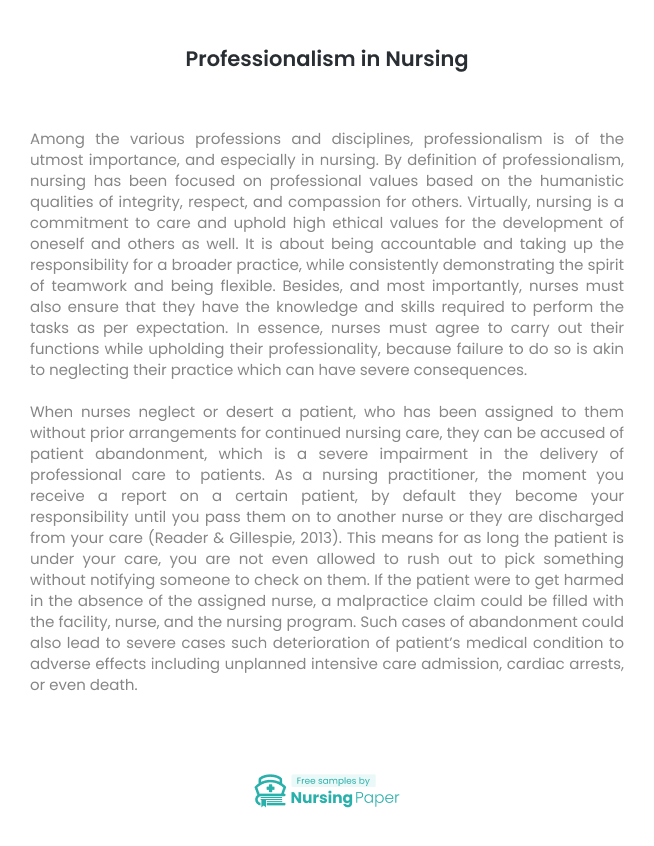
Professionalism in Nursing
Chapter 1
Among the various professions and disciplines, professionalism is of the utmost importance, and especially in nursing. By definition of professionalism, nursing has been focused on professional values based on the humanistic qualities of integrity, respect, and compassion for others. Virtually, nursing is a commitment to care and uphold high ethical values for the development of oneself and others as well. It is about being accountable and taking up the responsibility for a broader practice, while consistently demonstrating the spirit of teamwork and being flexible. Besides, and most importantly, nurses must also ensure that they have the knowledge and skills required to perform the tasks as per expectation. In essence, nurses must agree to carry out their functions while upholding their professionality, because failure to do so is akin to neglecting their practice which can have severe consequences.
When nurses neglect or desert a patient, who has been assigned to them without prior arrangements for continued nursing care, they can be accused of patient abandonment, which is a severe impairment in the delivery of professional care to patients. As a nursing practitioner, the moment you receive a report on a certain patient, by default they become your responsibility until you pass them on to another nurse or they are discharged from your care (Reader & Gillespie, 2013). This means for as long the patient is under your care, you are not even allowed to rush out to pick something without notifying someone to check on them. If the patient were to get harmed in the absence of the assigned nurse, a malpractice claim could be filled with the facility, nurse, and the nursing program. Such cases of abandonment could also lead to severe cases such deterioration of patient’s medical condition to adverse effects including unplanned intensive care admission, cardiac arrests, or even death.


Chapter 2
As part of the professional code of conduct, nurses should act within their knowledge and skills. By agreeing to perform a skill which they are inadequately qualified, is akin to acting outside their scope which can lead to nursing malpractice. As (Courtenay, 2001, p.13) asserts, in case one is assigned a procedure which they are not fully equipped or skilled to handle, then they should politely say no but in an appropriate manner.
Licensed and independently working nurses are also likely to face other situations that can be classified under patient abandonment. For example, a nurse who has just complete their shift may find that there is no other nurse to relieve them. The nursing officer may decide not to continue work and chose to leave the patient unattended; a kind of behavior that borders in unprofessionalism. Professional conduct dictates that the right way is first to notify the supervisor, and if no one is available to serve the shift, then for the sake of humanity, the nurse should continue with the patient care until they are released.
Whatever the circumstances, nurses are individually responsible and professional help accountable for the care they provide to their patients. Therefore, they should ensure that they have enough knowledge and skills to provide enhanced quality care, without risking patient abandonment.

1. Courtenay, M. (2001). Current issues in nurse prescribing. London: Greenwich Medical Media.
2. Reader, T. W., & Gillespie, A. (2013). Patient neglect in healthcare institutions: a systematic review and conceptual model. BMC Health Services Research, 13(156), p.1-15.



The download will start shortly.

The download will start shortly.
 Subject:
Nursing
Subject:
Nursing  Number of pages: 1
Number of pages: 1  Subject:
Health and Social Care
Subject:
Health and Social Care  Number of pages: 3
Number of pages: 3  Subject:
Health and Social Care
Subject:
Health and Social Care  Number of pages: 3
Number of pages: 3  Subject:
Nursing
Subject:
Nursing  Number of pages: 8
Number of pages: 8  Subject:
Nursing
Subject:
Nursing  Number of pages: 3
Number of pages: 3  Subject:
Nursing
Subject:
Nursing  Number of pages: 5
Number of pages: 5  Subject:
Medicine
Subject:
Medicine  Number of pages: 18
Number of pages: 18  Subject:
Health and Social Care
Subject:
Health and Social Care  Number of pages: 6
Number of pages: 6  Subject:
Nursing
Subject:
Nursing  Number of pages: 3
Number of pages: 3  Subject:
Nursing
Subject:
Nursing  Number of pages: 8
Number of pages: 8  Subject:
Nursing
Subject:
Nursing  Number of pages: 2
Number of pages: 2  Subject:
Medicine
Subject:
Medicine  Number of pages: 4
Number of pages: 4  Subject:
Nursing
Subject:
Nursing  Number of pages: 8
Number of pages: 8  Subject:
Nursing
Subject:
Nursing  Number of pages: 16
Number of pages: 16  Subject:
Medicine
Subject:
Medicine  Number of pages: 2
Number of pages: 2 
